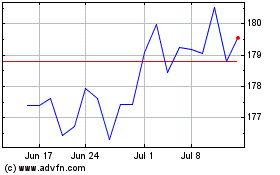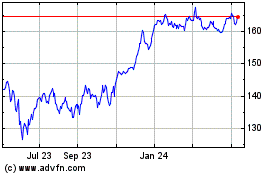By Chris Kornelis
Here come the 5G smartphones. Sort of.
In the coming months, you will be able to buy your first
smartphone compatible with faster 5G networks. It will likely come
loaded with features like a large screen and souped-up camera.
But you're probably going to have to spend north of $1,000 for
it -- and there is no guarantee it is going to instantly change
your mobile experience.
The big trade-offs
There are a couple of reasons why you likely won't get those
blazing-fast speeds that 5G promises soon. For one thing, coverage
is going to be limited.
The four largest U.S. wireless carriers -- AT&T Inc.,
Verizon Communications Inc., T-Mobile US Inc. and Sprint Corp. --
have all announced plans to roll out 5G this year. But their plans
include very few parts of the country -- only some large cities
like Los Angeles, Chicago and Atlanta. A full nationwide buildout
will take years.
"Even if you have a 5G phone this year, your chance of actually
accessing a 5G network is probably fairly low," says Mark Hung, an
analyst at research firm Gartner Inc.
For another thing, even if you are in an area that has 5G
coverage, there are technical limitations that can keep 5G from
delivering its full potential.
To understand why, consider that there are two ways to provide
5G coverage -- and the phone you choose may not be designed to
handle both.
One method delivers 5G signals on the high-frequency end of the
spectrum. The upside is extremely high speeds -- fast enough, it is
often said, to download whole seasons of a TV show in minutes. The
downside is that these signals don't go through walls or other
obstructions very well. The other method of delivering coverage --
using the lower end of the spectrum -- means that signals travel
better, but speeds aren't as fast.
Most carriers will eventually use both methods of delivery, but
at this point not all 5G phones will be able to access both -- so
choosing a phone means deciding which technical trade-off you want
to make. (That said, 5G phones will work with existing networks,
such as 4G LTE, so you won't get stuck if there isn't compatible 5G
coverage nearby.)
One big unknown, even among devices that have been unveiled: how
long their batteries will last. That may impact their appeal at
first, although battery life may improve in subsequent generations
as it has for prior models of smartphones.
Early adopters
Given all that, the big question for consumers will be: Should
you wait before buying a 5G phone? Not necessarily.
Tech fanatics may want to be in the first wave of 5G smartphone
owners, particularly if they live in a city where their carrier is
building out service. What's more, if you're due to upgrade your
phone this year, and you typically hold on to smartphones for
several years -- an increasingly common practice -- you may want to
consider making a change now in anticipation of 5G service.
"While the coverage is going to be fairly sparse this year, it's
going to improve quite a bit next year," says Mr. Hung, "and
definitely within the next three to four years, 5G coverage is
going to be fairly ubiquitous."
Manufacturers are trying to entice buyers to trade up by piling
on new features -- a common tactic when networks are upgraded, says
Jeff Howard, vice president of AT&T's mobile device
portfolio.
"I think the fact that you're seeing the rhetoric go up about
foldable devices, larger devices, much more storage on products,
performance on cameras, all those things starting to come along
with the 5G messaging globally starting to ramp up, I don't think
that's a coincidence," Mr. Howard says. "I think that's very much
intentional."
A wave of products
Several manufacturers have made announcements about new devices
recently. Samsung, for instance, announced that its new Galaxy S10
phone will have a 5G option that features a 6.7-inch screen and six
cameras. The device will be exclusive to Verizon for the first half
of 2019, and then this summer will be offered by AT&T, Sprint,
T-Mobile, Spectrum Mobile and Xfinity Mobile.
The phone's price and exact release date haven't been announced
yet, but Jeff Fieldhack, an analyst at Counterpoint Research,
expects 5G models to cost about $100 more than the comparable 4G
offerings, easily above $1,000. Samsung also announced a phone that
unfolds into a tablet -- starting at nearly $2,000 -- that will
also support 5G.
In the first half of the year, Verizon will begin selling an
attachment -- the 5G moto mod -- for the Motorola moto z3 phone
that will give it access to its 5G network. Sprint and Verizon,
meanwhile, will offer LG's first 5G smartphone, the LG V50 ThinQ
5G, in the spring and summer, respectively. And all the major
carriers expect many more 5G devices to be made available from a
variety of carriers in the not-so-distant future.
One manufacturer expected to sit out 5G in 2019 is Apple. Mr.
Hung says iPhone users will likely have to wait until 2020 before
Apple releases a 5G model, but he also doesn't expect that to cost
the company any market share in the U.S. Apple didn't respond to
requests to comment.
Mr. Kornelis is a writer in Seattle. Email reports@wsj.com.
(END) Dow Jones Newswires
February 26, 2019 14:33 ET (19:33 GMT)
Copyright (c) 2019 Dow Jones & Company, Inc.
T Mobile US (NASDAQ:TMUS)
Historical Stock Chart
From Mar 2024 to Apr 2024

T Mobile US (NASDAQ:TMUS)
Historical Stock Chart
From Apr 2023 to Apr 2024
